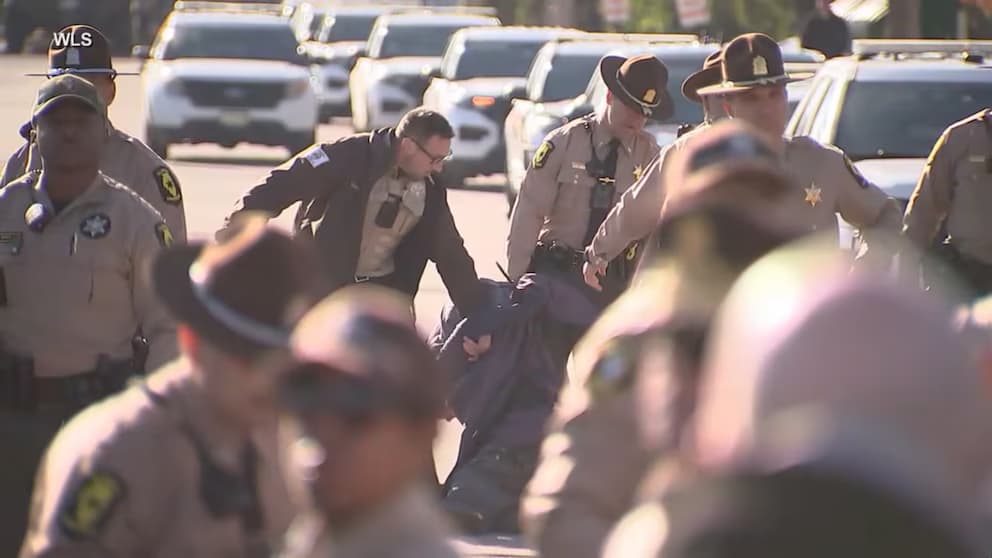We're loading the full news article for you. This includes the article content, images, author information, and related articles.
A major US federal immigration operation in North Carolina signals a widening crackdown, raising concerns for diaspora communities amid President Trump's aggressive deportation policies.

WASHINGTON D.C. – The United States Department of Homeland Security (DHS) has initiated a significant immigration enforcement operation in Charlotte, North Carolina, dubbed “Operation Charlotte's Web,” marking an escalation of President Donald Trump's nationwide crackdown on undocumented immigrants. The operation, which began on Saturday, November 15, 2025, has led to dozens of arrests and sparked widespread fear within immigrant communities, according to local officials and news reports.
On its first day, US Customs and Border Protection (CBP) agents arrested 81 individuals described by Commander Gregory K. Bovino as having "significant criminal and immigration history." A Homeland Security official later told CBS News that the total number of arrests in the Charlotte area by federal immigration agents, including both Border Patrol and Immigration and Customs Enforcement (ICE), was nearly 100 as of Saturday evening. The operation is part of a broader strategy to deploy federal agents to Democratic-led cities to enforce immigration laws, a policy that has previously been implemented in cities like Chicago and Los Angeles.
In a statement released on Saturday, November 15, DHS Assistant Secretary Tricia McLaughlin confirmed the deployment, stating, “We are surging DHS law enforcement to Charlotte to ensure Americans are safe and public safety threats are removed.” The department alleged that the operation targets "criminal illegal aliens" who have been released by local authorities under so-called "sanctuary" policies. The name of the operation itself has drawn criticism for its reference to a classic children's book, which some interpret as a cynical play on the idea of trapping people.
The crackdown has been met with strong condemnation from local leaders. Charlotte Mayor Vi Lyles, along with other city and county officials, released a joint statement criticizing the federal action for “causing unnecessary fear and uncertainty.” They assured residents that local police are not participating in the federal raids. Reports from the community describe a climate of fear, with some businesses closing and residents staying home to avoid encounters with agents. There have also been accounts of agents targeting individuals at churches and apartment complexes, and in one instance, a US citizen reported being forcibly stopped and detained by Border Patrol agents.
This operation aligns with President Trump's campaign promise to implement "the largest deportation programme" in US history. Since his inauguration for a second term on January 20, 2025, Trump has signed numerous executive orders aimed at restricting immigration, ending 'catch and release', and increasing deportations. This aggressive stance is part of a wider policy framework, sometimes referred to as 'Project 2025,' which seeks to empower federal agencies like ICE to conduct raids and expedited removals nationwide.
The administration's policies have also included significant changes to the legal immigration system. In October 2025, the US State Department mandated that all visa applicants, including Kenyans, must attend interviews in their country of citizenship, eliminating the flexibility of applying in third countries and removing most interview waivers. Furthermore, the administration is considering proposals that could end or curtail the Optional Practical Training (OPT) program, a vital pathway for international students, including thousands of Kenyans, to gain work experience after graduation.
While there is no specific information indicating that the Charlotte operation is targeting Kenyan nationals, the broader policy shift creates a climate of uncertainty for the estimated 157,000 Kenyan-born residents in the US, a significant portion of whom may be undocumented. According to data from US Immigration and Customs Enforcement (ICE) as of late 2024, 1,282 Kenyan nationals were identified for deportation. Between October 2020 and September 2024, 128 Kenyans were deported from the US.
The tightening immigration rules and increased enforcement actions pose a significant risk to Kenyans living in the US without legal status. The potential for increased deportations could have severe economic and social consequences, disrupting the flow of remittances—a crucial part of Kenya's economy—and tearing families apart. The Kenyan diaspora is a major source of foreign exchange for Kenya, with remittances hitting a record Ksh1 trillion as of November 2025, a significant portion of which comes from the United States. The current enforcement climate underscores the precarious position of many diaspora members and highlights the far-reaching impact of US domestic policy on Kenyan families and the national economy.
Keep the conversation in one place—threads here stay linked to the story and in the forums.
Sign in to start a discussion
Start a conversation about this story and keep it linked here.
Other hot threads
E-sports and Gaming Community in Kenya
Active 9 months ago
The Role of Technology in Modern Agriculture (AgriTech)
Active 9 months ago
Popular Recreational Activities Across Counties
Active 9 months ago
Investing in Youth Sports Development Programs
Active 9 months ago